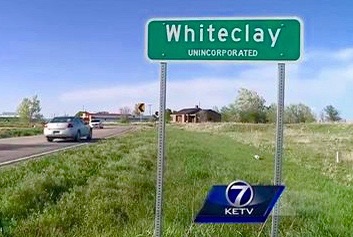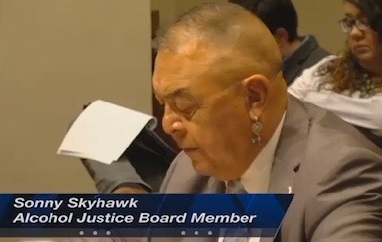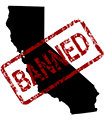Blog
Activists Encourage Nebraska Senator's Life-Saving Proposal, Legislation to Follow in 2017 - 10/26/16
- Details
- Created: Wednesday, October 26 2016 15:47
by Michael Scippa
 Alcohol Justice continues to provide media and strategic organizing support to the Oglala Sioux Tribe on the Pine Ridge Indian Reservation in South Dakota for their campaign to shut down the liquor stores across the border in Whiteclay, Nebraska.
Alcohol Justice continues to provide media and strategic organizing support to the Oglala Sioux Tribe on the Pine Ridge Indian Reservation in South Dakota for their campaign to shut down the liquor stores across the border in Whiteclay, Nebraska.
This past summer, Alcohol Justice initiated a successful Action Alert that generated over 635 letters to Nebraska State leaders asking them to support the work of State Senator Patty Pansing Brooks who declared that Whiteclay was a public health disaster for alcohol-related harm. Documented outcomes of liquor sales in the tiny town include widespread homelessness, alcoholism, sex trafficking, and alarming rates of fetal alcohol spectrum disorders. Senator Pansing Brooks is proposing legislation to deal with the illegal and illicit activity taking place at Whiteclay.
On October 11, 2016 the General Affairs Committee of the Nebraska Legislature heard testimony on LR567—an interim study introduced by Senator Brooks designed to examine and review the sale of alcohol in Whiteclay and the need for additional funding for law enforcement. Alcohol Justice drove three activists from Pine Ridge to participate in the hearing: Olowan Thunderhawk Martinez, Wambliwin Red Cloud, and former Tribal President Bryan Brewer. Alcohol Justice Board member Sonny Skyhawk also attended and testified, as did Alcohol Justice Advocacy Director Jorge Castillo.
Prior to the hearing all the people involved had a meeting with Senator Brooks. A strong and cordial relationship was established between Senator Brooks and the Pine Ridge activists. The group of participants agreed to continue to work together with the Senator to craft legislation next year. The hearing received extensive radio, TV, print and online media coverage.
media coverage.
Earlier in the month, activist Olowan Thunderhawk Martinez was extradited to Nebraska to face allegations of criminal misconduct related to a Women's Day of Peace Rally at Whiteclay a few years ago. From all accounts it appears to be an attempt to criminalize her activism in order to neutralize the ongoing efforts to address the problems in the area. Alcohol Justice agreed to pay her bail and to assist with her attorney fees. As it turned out, being on bail allowed her to freely move in Nebraska and to testify at the hearing. Her extradition to Nebraska brought national media attention to her case and to the problems at Whiteclay.
In addition to legislation being proposed for 2017, due to a complete lack of enforcement capability in Whiteclay, the four liquor stores in the cross-hairs of controversy for their illegal practices will be forced by the Nebraska Liquor Control Commission to re-apply for their licenses to operate. Lack of law enforcement is grounds for denial of issuing alcohol licenses in the state.
Please TAKE ACTION to send your message of encouragement and support to Nebraska State leaders.
Powdered Alcohol Update - October
- Details
- Created: Wednesday, October 26 2016 15:12
 The biggest shoe of all has dropped on the market for powdered alcohol. On September 26, 2016, Governor Jerry Brown signed into law a bill prohibiting the sale, manufacturing, and possession of powdered alcohol in the state of California. California joins 33 other states in banning the substance. One other state—Wisconsin—is currently considering a ban, as is the District of Columbia.
The biggest shoe of all has dropped on the market for powdered alcohol. On September 26, 2016, Governor Jerry Brown signed into law a bill prohibiting the sale, manufacturing, and possession of powdered alcohol in the state of California. California joins 33 other states in banning the substance. One other state—Wisconsin—is currently considering a ban, as is the District of Columbia.
Although relatively slow to enact legislation against "palcohol", California represents a major victory for opponents of the easy to hide, hard to monitor substance. As the most populous state in the country, California is also the largest alcohol market. Strong legislation in the state both prevents harm to the public and directly impacts palcohol manufacturers’ revenue, limiting their war chests in states that have yet to enact permanent restrictions.
Still, almost a third of the country either allows regulated powdered alcohol sales (three states), or has yet to enact any legislation regarding the substance (12 states). "We call on all states to move quickly and decisively to make sure powdered alcohol stays off shelves," said Alcohol Justice Executive Director/CEO Bruce Lee Livingston. "It's a stupid product that's hard to monitor and plays directly to an underage audience. Get it off the market."
The states that have yet to permanently ban palcohol are: Arizona, Arkansas, Colorado, Delaware, Florda, Iowa, Kentucky, Mississippi, Missouri, Montana, New Mexico, Oklahoma, South Dakota, Texas, Wisconsin, Wymoing, as well as the District of Columbia. If you live in these states, TAKE ACTION now to tell your local regulators and legislators to ban powdered alcohol.
Alcohol Justice CEO Presents on Alcohol Marketing in Breast Cancer Awareness
- Details
- Created: Monday, October 17 2016 17:07
 The national outpouring of support for breast cancer research and education means the world has never been pinker—and savvy alcohol marketers knows how to capitalize on the color to sell their own brands. The pink-themed campaigns intended to raise funds for and awareness of one of the most common cancers in women seem unimpeachable. But when it comes to alcohol companies, how much are they raising and at what cost to public health?
The national outpouring of support for breast cancer research and education means the world has never been pinker—and savvy alcohol marketers knows how to capitalize on the color to sell their own brands. The pink-themed campaigns intended to raise funds for and awareness of one of the most common cancers in women seem unimpeachable. But when it comes to alcohol companies, how much are they raising and at what cost to public health?
Alcohol Justice Executive Director and CEO Bruce Lee Livingston, MPP, explored these issues in a session on “Pinkwashing and Corporate Marketing” at the 2016 Wisconsin Alcohol Policy Seminar, on October 20, 2016. Mr. Livingston addressed the discrepancy between ad budgets and actual donations, and the push to make alcohol seem socially responsible even as drinking is linked to breast cancer. DOWNLOAD Mr. Livingston's presentation.
More Articles ...
Subcategories
Help us hold Big Alcohol accountable for the harm its products cause.
| GET ACTION ALERTS AND eNEWS |
STAY CONNECTED    |
CONTACT US 24 Belvedere St. San Rafael, CA 94901 415-456-5692 |
SUPPORT US Terms of Service & Privacy Policy |


